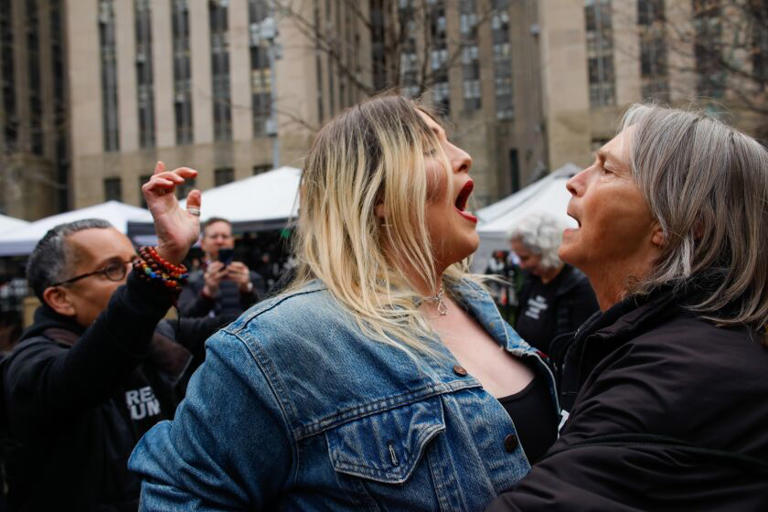Many unsettling statistics jumped out at me as I watched “Trustworthy: All Voices Heard,” a new documentary about how mistrust in media, exacerbated by rampant misinformation and disinformation on social media, can corrode our faith in democracy:
More than two-thirds of all Americans perceive a serious threat to our democracy.
Half of all Americans believe there will be civil war in the United States in the next few years.
And — no surprise here — two-thirds of Americans feel worn out by the news they are getting today.
“We are 100% the Divided States of America,” says Kevin Geffers Sr., a Texas painter interviewed by Stephany Zamora, a first-time filmmaker who was so unsettled by the events of Jan. 6 that she loaded up a bus with her crew and traveled more than 5,000 miles across the country interviewing journalists, media experts and civilians. Was it possible, she asked, for people on opposite sides of the political spectrum to find common ground when we can’t even agree on what is true?

“The American people are confused and frustrated,” former Fox News anchor Laurie Dhue tells the filmmaker.
“Not knowing what the truth is is terribly hard for our democracy, it scares me a lot,” says Columbia University journalism professor and historian Andie Tucher.
We also encounter MIT management professor Sinan Aral, who wrote “The Hype Machine,” a 2020 book about the “perils and promise” of social media. Aral, who has studied social networks for 20 years, made three predictions in the book: that fake news would catalyze political violence, that anti-vaxx misinformation could disrupt the rollout of vaccines and that social media had the power to sway equity markets. All of three came true, and it didn’t take long.
The Jan. 6 insurrection was the direct result of the execrable lie that Democrats had stolen the 2020 election from former President Trump.
In January 2021, a major vaccination effort at Dodger Stadium was interrupted when anti-vaxx protesters shut it down for nearly an hour.
Also in January 2021, a Reddit-driven effort to revive the stock price of the struggling video game retailer GameStop resulted in the stock rising 1,000% in two weeks.
“Social media is rewriting the central nervous system of humanity by algorithmically connecting, informing, nudging, persuading, mobilizing, and yes, entertaining us,” writes Aral in a new preface to “The Hype Machine.” “It’s been doing so for years, with clear, measurable and profound implications for our democracies, our economies and our public health. And it’s time we woke up to these realities.”
Where, oh, where is Walter Cronkite when you need him?
I kid.
As trustworthy a figure as Uncle Walter was, he represents a world that is long gone. That was a world where Americans got their news from the three major television networks, AM radio and their local newspapers. There was no cable news, no Google, no Facebook, no TikTok, no Twitter/X. No podcasts. There was no online Russian interference in our presidential elections, no deep fakes, no AI.
Yet even before all those digital distractions and deceptions, I daresay we have always been a nation divided. Division, in some ways, is the essence of democracy.
But what has become so distressing in our current moment is the cynical and widespread manipulation of those divisions with the use of outright lies. Truth itself, something we used to be able to agree on, has been undermined.
From 2016 to 2021, according to the nonpartisan Pew Research Center, the percentage of Americans who have “a lot or some” trust in national news dropped from 76% to 58%.
“Most of the decline,” reports Pew, “has come from Republicans or those who lean Republican.”
Big surprise there. Not.
Trump was elected in 2016 and began (or, rather, continued) to spout lies with the velocity of a gushing fire hose. He popularized the phrase “fake news” to describe any information he disagreed with. Years earlier, he spread racist lies about former President Obama’s birthplace. Once in office, his first big official lie was about the size of his inauguration crowds. He lied about global climate change, calling it a Chinese hoax. He lied about the danger posed by the coronavirus and undermined his administration’s health experts. His most corrosive lie was that he won the 2020 presidential election, something he and his allies repeated so many times that a shocking proportion of Republicans actually believe it, and hundreds of his supporters acted on it on Jan. 6, 2021.
Naturally, social media has played a huge role in propagating Trump’s falsehoods and riling up his believers. (And yes, of course, Democrats lie, but not on a scale that compares to the GOP under Trump.)
We have known for a long time, as the Poynter Institute’s Kelly McBride tells Zamora in the documentary, that “Facebook placed a disproportionate amount of emphasis on anger in its algorithm. As a result, stories that made you angry were more likely to pop up on your Facebook feed.”
And we know that anger creates political engagement. We see successful, anger-driven engagement on every political level — from conservative outrage over who uses which bathrooms to liberal outrage over abortion bans.
Anger is not a problem in and of itself. Anger drove the civil rights movement, the Black Lives Matter movement. Anger drove the Vietnam-era antiwar movement. Anger drove the second wave of feminism and #MeToo. Righteous anger is a good thing.
The problem with our current moment is not that we are more divided than ever; it’s not that we get angry about important issues. It’s that so much of our division springs from lies that spread unchecked on social media.
One poignant moment from “Trustworthy” has stayed with me. The MSNBC journalist Ali Velshi says he really thought that the advent of social media would mean no one would be able to lie anymore because they’d never get away with it.
“Trustworthy” notes that there are many efforts afoot to increase social media literacy and improve critical thinking skills in hopes of decreasing polarization. YouTube, Facebook et al have taken baby steps to combat the spread of misinformation, especially important with the 2024 presidential campaign in full swing, and the Republican front-runner quintupling down on his lies about 2020.
CNN announced it would stop over-hyping stories as “breaking news.” A company called Ground News aggregates news from multifarious sources that are labeled “left,” “right” and “center.” Poynter has created the Teen Fact-Checking Network, a virtual newsroom of middle- and high-school students who use social media to debunk viral misinformation.
“Critical thinking,” former NBCUniversal executive Paula Madison tells Zamora. “Without it, you’re a sheep.”
@robinkabcarian
This story originally appeared in Los Angeles Times.



